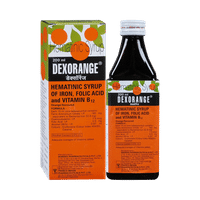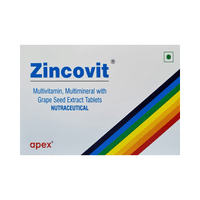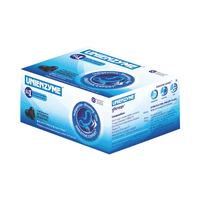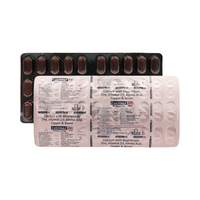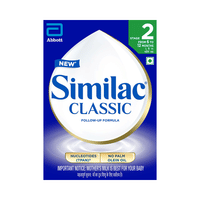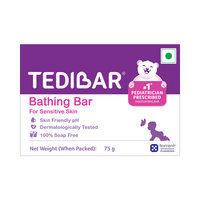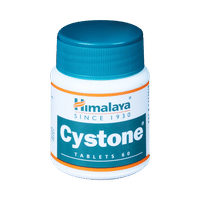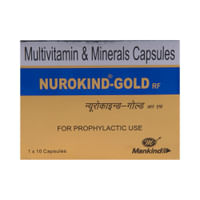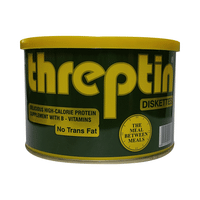Rs.176for 1 bottle(s) (200 ml Syrup each)
food interaction for Scrovit-L
alcohol interaction for Scrovit-L
pregnancy interaction for Scrovit-L
lactation interaction for Scrovit-L
food
alcohol
pregnancy
lactation
Scrovit-L Syrup may be taken with or without food.
None
None
CAUTION
It is not known whether it is safe to consume alcohol with Scrovit-L Syrup. Please consult your doctor.
CONSULT YOUR DOCTOR
Information regarding the use of Scrovit-L Syrup during pregnancy is not available. Please consult your doctor.
CONSULT YOUR DOCTOR
Information regarding the use of Scrovit-L Syrup during breastfeeding is not available. Please consult your doctor.
CONSULT YOUR DOCTOR
SALT INFORMATION FOR Scrovit-L
Biotin(100mcg)
Uses
Biotin is used in the treatment of nutritional deficiencies.
How it works
Biotin is a form of vitamin B that provides essential nutrients.
Common side effects
No common side effects seen
Copper(500mcg)
Uses
Copper is used in the treatment of nutritional deficiencies.
How it works
Copper provides essential nutrients
Common side effects
Anemia (low number of red blood cells), Bloody diarrhea, Fever, Nausea, Stomach pain, Vomiting, Cardiac disorder, Decreased blood pressure
Cyanocobalamin(1mcg)
Uses
Cyanocobalamin is used in the treatment of vitamin B12 deficiency.
How it works
Cyanocobalamin is a form of vitamin B12 that provides essential nutrients.
Common side effects
No common side effects seen
Folic Acid(100mcg)
Uses
Folic Acid is used in the treatment of anemia due to chronic kidney disease, iron deficiency anemia and anemia due to folic acid deficiency.
How it works
Folic Acid is a form of vitamin B. It plays a vital role in the formation of red blood cells, which carry oxygen throughout the body. It is also essential in pregnancy due to its role in the development of the unborn baby's brain and spinal cord.
Common side effects
No common side effects seen
Iodine(100mcg)
Uses
Iodine is used to prevent infections.
How it works
Not known.
Common side effects
Joint pain, Bronchitis (inflammation of the airways), Conjunctivitis, Runny nose, Enlarged salivary gland, Headache, Iodine toxicity, Rash, Salivation, Sneezing, Hives, Vasculitis
Lycopene(1000mcg)
Uses
Lycopene is used in nutritional deficiencies.
How it works
Lycopene acts an antioxidant by fighting free radicals in the body. Due to its antioxidant property, it reduces the risk of cancer and cardiovascular disease.
Common side effects
Nausea, Diarrhea, Indigestion, Vomiting
Magnesium(100mcg)
Uses
Magnesium is used in the treatment of nutritional deficiencies.
How it works
Magnesium provides essential nutrients
Common side effects
Nausea, Acute toxicity, Watery diarrhoea, Flushing (sense of warmth in the face, ears, neck and trunk), Gastrointestinal discomfort, Decreased blood pressure, Rash, Upset stomach, Vomiting
Niacinamide(25mg)
Uses
Niacinamide is used in the treatment of nutritional deficiencies.
How it works
Niacinamide, also known as vitamin B3, works by supporting various cellular processes in the body. It plays a key role in converting food into energy, repairing DNA, and maintaining healthy skin, nerves, and digestion. In cholesterol control, Niacinamide helps by reducing the production of "bad" cholesterol (LDL) and triglycerides in the liver while increasing "good" cholesterol (HDL). It does this by inhibiting an enzyme involved in cholesterol synthesis, leading to improved lipid profiles and a lower risk of heart disease.
Common side effects
Nausea, Dry skin, Headache, Heartburn, Hepatobiliary disorder, Liver toxicity, Stiffness of face, Fatigue, Rash, Skin hyperpigmentation, Inflammation of the nose, Stomach pain, Indigestion
Pyridoxine Hydrochloride(1.5mg)
Uses
Pyridoxine Hydrochloride is used in the treatment of nutritional deficiencies.
Common side effects
Selenium(35mcg)
Uses
Selenium is used in the treatment of nutritional deficiencies.
How it works
Selenium provides essential nutrients
Common side effects
Nervous system disorder, Fatigue, Garlic breath odor, Irritation, Rash, Hair loss, Nail disorder
Zinc(3mg)
Uses
Zinc is used in the treatment of nutritional deficiencies.
How it works
Zinc is a micro mineral. It maintains mucous lining in the stomach. It also promotes water and electrolyte absorption in the body. It also increases the circulation of enzymes, which act against infections like diarrhea. It enhances the immunity by increasing immune boosting cells. This is how it works in resisting infections such as diarrhea.
Common side effects
No common side effects seen
SUBSTITUTES FOR Scrovit-L
No substitutes foundExpert advice FOR Scrovit-L
Do consult your doctor if you are receiving kidney dialysis as higher doses of biotin may be needed. Do consult your doctor before taking biotin if you have,
- Kidney disease.
- Undergone stomach surgery.
- If you smoke.
Do inform your doctor about all medications currently taken before starting biotin supplementation.
Frequently asked questions FOR Scrovit-L
Biotin
Q. What is Biotin? What is it used for?
Biotin consists of vitamin B7 which is commonly known as biotin. It is a water-soluble, B-complex vitamin that contributes to healthy metabolic, nerve, digestive and cardiovascular functions. Biotin helps to provide vitamin B7 which is essential for metabolizing fats and carbohydrates. This also helps strengthen hair, increase nail thickness and prevent split ends and thinning hair.
Q. What causes the deficiency of biotin?
The deficiency of biotin is extremely rare. However, it may be seen commonly in cases of inadequate dietary intake, alcoholism, smoking or a genetic disorder, such as Crohn’s disease, that affects biotin metabolism. Long-term antibiotic usage has also been associated with biotin deficiency.
Q. What are the symptoms of biotin deficiency?
Symptoms of a biotin deficiency include skin rashes, brittle and thinning hair and nails, seborrheic dermatitis and alopecia (hair loss). If you experience any of these, consult your doctor.
Copper
Q. Is copper good for health?
Copper is a mineral required for normal health. It is required by body to use iron. It is also important for nerve function, bone growth, and to help your body use sugar
Q. Can you take copper with vitamin c?
Yes. Major interaction doesn’t occur if copper is taken along with vitamin C.
Cyanocobalamin
Q. What is Cyanocobalamin? What is it used for?
Cyanocobalamin is the synthetic form of Vitamin B12. It helps to prevent deficiency of B12 in the body. Vitamin B12 plays an important role in the formation of red blood cells and also helps in absorption of iron in the body. When taken in combination with other vitamins, it helps to strengthen the immune system and improve metabolism of the body. Along with that, it is also considered important for the nervous system.
Q. Is Cyanocobalamin effective?
Cyanocobalamin is effective if used in the dose and duration advised by your doctor. Do not stop taking it even if you see improvement in your condition. If you stop using Cyanocobalamin too early, the symptoms may return or worsen.
Q. How is Cyanocobalamin administered?
Cyanocobalamin should be administered under the supervision of a trained healthcare professional or a doctor only and should not be self-administered. The dose will depend on the condition you are being treated for and will be decided by your doctor. Follow your doctor’s instructions carefully to get maximum benefit from Cyanocobalamin.
Folic Acid
Q. Is it ok to take Folic Acid when not pregnant?
Usually, folic acid requirements are met from the diet and therefore additional supplements are not required. In general, Folic Acid is recommended only when you have a deficiency of folic acid. However, Folic Acid is advised to women who are pregnant and who want to conceive. The medicine should be taken at least 4 weeks before pregnancy and should continue its use up to 3 months of pregnancy. Consult your doctor if not sure.
Q. Can Folic Acid cause weight gain?
Animal studies on Folic Acid suggest that taking the medicine in excess along with a high-fat diet may lead to weight gain and fat accumulation. But this weight gain was not evident when taken along with a normal or low-fat diet, even with excess Folic Acid. In humans, similar studies have not been conducted and therefore knowledge regarding weight gain is lacking. Therefore, if you are on Folic Acid eat a low-fat meal to be on the safer side.
Q. How long does Folic Acid take to work?
Folic Acid usually starts working within a few hours of taking it. If you are taking it for iron deficiency anemia, you may start feeling better after a few weeks of taking it. In case you are taking it during pregnancy, you may not notice any difference but this does not mean that the dose is not working. Continue taking Folic Acid for the duration recommended by your doctor.
Iodine
Lycopene
Magnesium
Niacinamide
Q. What is Niacinamide, what is it used for?
Niacinamide is a medicine used in the treatment of conditions caused by low levels of vitamin B3 in the body. It reduces the cholesterol levels to normal. It also helps in the treatment of symptoms like loss of appetite, weakness, diarrhea, skin inflammation, and mental changes.
Q. Is Niacinamide effective?
Niacinamide is effective if used in the dose and duration advised by your doctor. Do not stop taking it even if you see improvement in your condition. If you stop using Niacinamide too early, the symptoms may return or worsen.
Q. How should Niacinamide be taken?
Niacinamide should be taken in the dose and duration advised by your doctor. It can be taken with or without food. However, it is advised to take it at the same time each day to avoid the chances of missing a dose.
Pyridoxine Hydrochloride
Selenium
Q. Can I take selenium with synthyroid/ levothyroxine/ armour thyroid/ thyroxin?
There are no known interactions of selenium with any thyroid preparations such as synthyroid/ levothyroxine/ armour thyroid/ thyroxin. Selenium which is a part of selenoprotein (iodothyronine deiodinases) is essential for the conversion of thyroxine (T4) to the biologically active thyroid hormone triiodothyronine (T3) thereby it is important in thyroid hormone functioning
Q. Can I take selenium with calcium?
There are no known interactions of selenium with minerals such as calcium
Q. Can I take selenium with other vitamins/ vitamin C/ zinc?
Yes. Selenium (gluthathione peroxidase) has been reported to support the activity of vitamin E in limiting the oxidation of lipids (fats). Selenium also interacts with zinc (it affects cellular redox status). Selenium can, however, be taken with vitamins/ zinc; the combinations are available as a part of multivitamin preparation













